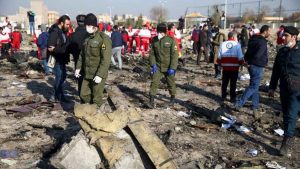 DUBAI: Iran said on Tuesday it had arrested people accused of a role in shooting down a Ukrainian airliner and had also detained 30 people involved in protests that have swept the nation for four days since the military belatedly admitted its error.
DUBAI: Iran said on Tuesday it had arrested people accused of a role in shooting down a Ukrainian airliner and had also detained 30 people involved in protests that have swept the nation for four days since the military belatedly admitted its error.
Wednesday`s shooting down of Ukraine International Airlines flight 752, killing all 176 people aboard, has led to one of the biggest public challenges to the Islamic Republic`s clerical rulers since they took power four decades ago.
President Hassan Rouhani promised a thorough investigation into the “unforgivable error” of shooting down the plane, in an address on Tuesday. It was the latest in a series of apologies by the leadership that has done little to quell public anger.
Britain, France and Germany also increased diplomatic pressure on Iran, launching a dispute mechanism to challenge Tehran for breaching limits on its nuclear programme under an agreement which Washington abandoned in 2018.
Tehran has faced an escalating confrontation with the West and a wave of unrest since the United States killed Iran`s most powerful military commander in a drone strike on January 3.
Iran shot down the plane on Wednesday when its military was on high alert, hours after firing missiles at US targets in Iraq. It admitted the mistake on Saturday after days of denials.
Judiciary spokesman Gholamhossein Esmaili said some of those accused of having a role in the plane disaster had been arrested, although he did not say how many or identify them.
Since the official admission, protesters, many of them students, have held daily demonstrations, chanting “Clerics get lost!” and calling for the removal of Supreme Leader Ayatollah Ali Khamenei, in power for more than 30 years.
Police have responded to some protests with a violent crackdown, video posts on social media showed, with police beating protesters with batons, wounded people being carried, pools of blood on the streets and the sound of gunfire.
A video to emerge on Tuesday showed an officer using an electric baton to shock a man as he writhed on the ground. Iran`s police have denied firing at protesters and said officers were ordered to act with restraint. The judiciary said 30 people had been detained in the unrest but said the authorities would show tolerance towards “legal protests”.
Protests on Tuesday appeared peaceful, with scores gathering at two Tehran universities. “Where is justice?” some shouted. The extent of the unrest is difficult to assess because of limits on independent reporting. Demonstrations tend to gather momentum into the night.
The domestic unrest triggered by the plane crash comes just two months after the most violent crackdown on protests since the revolution. The authorities killed hundreds of people to put down an uprising last November when demonstrators torched banks and petrol stations.
Adding to international tensions, the judiciary spokesman branded Britain`s ambassador an “undesirable element”, after he was briefly detained on Saturday, accused of inciting protests. The ambassador said he had been attending a vigil for victims.
London said it had not been notified of any move to expel its envoy, Rob Macaire, and said such a step would be regrettable. Iran`s Foreign Ministry, rather than the judiciary, would be responsible for any decision to expel him.
London hosts a meeting on Thursday for Canada, Ukraine, Britain and other nations who had citizens on the plane. Ukraine said the gathering would consider legal action against Tehran.
Rouhani said the government would be accountable to Iranians and those nations who lost citizens. Most of those on board the flight were Iranians or dual nationals.
The disaster and subsequent unrest comes amid one of the biggest escalations between Tehran and Washington since 1979. Missiles launched at a US base in Iraq killed an American contractor in December, an attack Washington blamed on an Iran-backed group. Confrontation eventually led to the US drone strike on January 3 that killed Qassem Soleimani, architect of Iran`s regional network of proxy militias.
Iran`s government was already reeling from the reimposition of sanctions by the United States, which quit an agreement with world powers under which Tehran would secure sanctions relief in return for scaling back its nuclear programme.
Since Washington withdrew, Tehran has stepped back from its nuclear commitments and has said it would no longer recognise limits on enriching uranium. After months of threatening to act, European signatories to the deal, France, Britain and Germany, activated the agreement`s dispute mechanism on Tuesday.
Iran dismissed the “completely passive action” of the Europeans and said it wants constructive steps to save the nuclear deal. Elsewhere in the Middle East, where Iran has wielded influence through a network of allied movements and proxies, governments that include powerful Iran-sponsored armed factions have faced months of hostile demonstrations in Lebanon and Iraq.
Leave a Reply